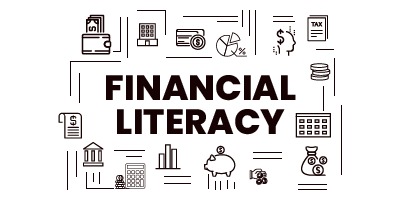In today’s complex financial landscape, making informed decisions about your money is more important than ever. Financial literacy provides the knowledge and skills to manage your finances effectively, leading to greater financial security and the ability to achieve your goals. Let’s dive into what financial literacy means, why it’s essential, and how to improve it.
What is it?
Financial literacy encompasses understanding key financial concepts, like budgeting, saving, debt management practices, investing, and retirement planning. It’s about making smart choices with your money, avoiding costly mistakes, and building a solid foundation for your financial future.
Why it Matters
- Empowering Decision-Making: Financial literacy allows you to make informed decisions about spending, saving, and borrowing, setting you on a path to financial stability.
- Financial Independence: Building good money habits helps you achieve financial independence, living your life on your terms without relying solely on others.
- Debt Management: A sound understanding of debt, its pitfalls, and strategies for repayment prevents crippling debt burdens.
- Investing for the Future: Being financially literate enables you to understand investment options and build wealth over time.
- Reduced Financial Stress: Having control over your finances reduces stress and improves overall well-being.
Improving Your Financial Literacy
The good news is, you can increase your financial literacy at any stage of life. Here’s how to get started:
- Assess Your Current Situation: Begin by honestly evaluating your spending habits, debts, and overall net worth. There are plenty of online budgeting tools to assist with this.
- Set Financial Goals: Determine what you want to achieve financially – such as buying a house, saving for retirement, or paying off student loans. Having clear goals makes it easier to manage your money.
- Seek Reliable Resources: Utilize the many online and offline resources available. Check out personal finance blogs, websites of credible financial institutions, or government financial education programs.
- Stay Informed: Develop a habit of reading financial news and articles to stay up-to-date on economic trends and investment strategies. Reliable sources like the Wall Street Journal or Forbes are great places to start.
- Consider Professional Advice: For complex financial decisions (like setting up trusts or estate planning), consult a financial advisor who can provide personalized guidance.
The Long-Term Benefits of Financial Literacy
Financial literacy isn’t about getting rich quick. It’s a lifelong journey that creates a lasting impact on your financial well-being. By prioritizing financial literacy, you can:
- Achieve financial stability
- Eliminate financial anxieties
- Reach major financial milestones
- Secure a comfortable retirement
- Break generational cycles of financial hardship
Start Your Journey Today
Take control of your financial future by making financial education a priority. The time and effort you invest in improving your financial literacy will pay dividends for years to come.
Searching for Tourism news?
Explore Textify’s AI membership
Need a Chart? Explore the world’s largest Charts database ->Textify Analytics
